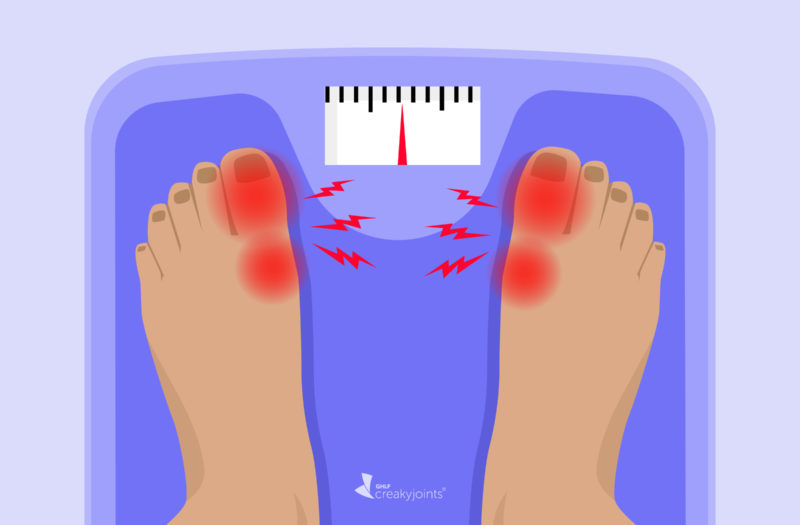Gout, an inflammatory form of arthritis infamous for causing excruciating pain in the big toe, has long been tied to obesity. (In fact, it was once known as the “disease of kings” because it commonly occurred in wealthy men who could afford to overindulge in food and alcohol.)
Although there are many reasons why someone might develop gout — genetics and medical conditions like kidney disease are among the most important — new research confirms that weight remains a risk factor.
The study, which was published in the journal Arthritis Research & Therapy, used data from the National Health and Nutrition Examination Survey (NHANES) to determine whether or not weight change during adulthood impacts the incidence of gout. The NHANES is a program run by the U.S. Centers for Disease Control and Prevention (CDC) to assess the health and nutritional status of people in the United States. For this study, researchers looked at the data for adults ages 40 to 74 between 2007 and 2014.
More than 11,000 participants were asked to recall how much they weighed at age 25, as well as 10 years before the survey was taken, in order to track fluctuations in weight. Cases of gout were reported by participants during the initial survey, as well as during follow-up surveys.
The researchers discovered that people who gained a lot of weight as adults had a higher risk of developing gout. Specifically, people who became obese as adults were 1.65 times more likely to develop gout than stable non-obese participants. Similarly, people had been obese throughout their life (deemed “stable obese” by researchers) were 1.84 times more likely to develop gout than stable non-obese participants. Those who were obese but lost weight were less likely to develop gout and less likely to have frequent gout flares.
This study was not without its limitations, as the researchers note. The use of self-reporting for weight in early, for example, may have resulted in misclassification of patients. There was also the chance that gout may have been underreported, as the researchers relied on patient reports instead of medical reports. Despite this, however, the researchers are confident that their findings support the current theories around weight and gout.
“Taken together, the findings support that maintaining normal weight over the whole of adulthood is beneficial and reduces the risk of gout among obese individuals,” the researchers wrote.
Although it’s not exactly clear why obesity is associated with gout, other studies have suggested that weight gain is associated with increased levels of uric acid in the bloodstream. Gout occurs when uric acid is not properly excreted from the body, so it crystallizes and settles in joints.
Found This Study Interesting? Here’s How You Can Be Part of Arthritis Research
If you’re diagnosed with arthritis or another musculoskeletal condition, participate in future studies like this by joining CreakyJoints’ patient research registry, ArthritisPower. ArthritisPower is a patient-led, patient-centered research registry for joint, bone, and inflammatory skin conditions. Learn more and sign up here.
Bai L, et al. Incident gout and weight change patterns: a retrospective cohort study of US adults. Arthritis Research and Therapy. March 2, 2021. doi: https://doi.org/10.1186/s13075-021-02461-7.
Gout. Johns Hopkins Arthritis Center. https://www.hopkinsarthritis.org/arthritis-info/gout.
Walsh N. Persistent or New Obesity Linked With Gout. MedPage Today. March 3, 2021. https://www.medpagetoday.com/rheumatology/generalrheumatology/91460.






